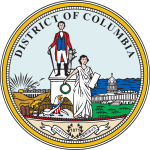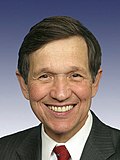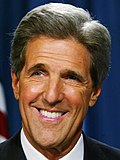
From January 14 to June 8, 2004, voters of the Democratic Party chose its nominee for president in the 2004 United States presidential election.

The 2004 Iowa Democratic presidential caucuses were an election held on January 19 as part of the United States presidential primary. They were the first major test of some of the leading contenders for the Democratic Party's nomination as its candidate for the 2004 United States presidential election.
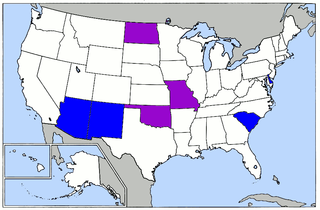
Mini-Tuesday was the name given to the February 3, 2004 U.S. presidential primary where several states, which to that point had participated in "Super Tuesday," cast their votes for the Presidential nominees of the 2004 Presidential election. Mini-Tuesday was also called Super Tuesday I. With the large number of states moving their election dates up to Mini-Tuesday for the 2008 election cycle, pundits have largely shied away from using the term again, instead choosing to reappropriate the term "Super Tuesday" to better represent the primaries held on that approximate date. The date is also known as "Super Duper Tuesday," "Giga Tuesday," and "Tsunami Tuesday," among others, with the term "Mini Tuesday" falling to apparent disuse for the time being.
In American politics, a superdelegate is a delegate to a presidential nominating convention who is seated automatically.
The following is a timeline of events during the 2004 U.S. presidential election:
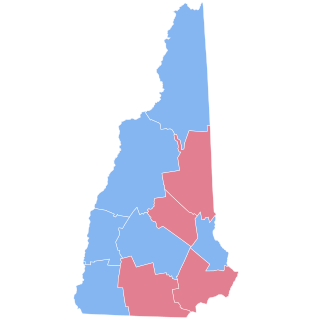
The 2004 United States presidential election in New Hampshire took place on November 2, 2004, and was part of the 2004 United States presidential election. Voters chose four representatives, or electors to the Electoral College, who voted for president and vice president.

From January 3 to June 3, 2008, voters of the Democratic Party chose their nominee for president in the 2008 United States presidential election. Senator Barack Obama of Illinois was selected as the nominee, becoming the first African American to secure the presidential nomination of any major political party in the United States. However, due to a close race between Obama and Senator Hillary Clinton of New York, the contest remained competitive for longer than expected; neither candidate received enough pledged delegates from state primaries and caucuses to achieve a majority, without endorsements from unpledged delegates (superdelegates).
The following is a timeline of major events leading up to and immediately following the United States presidential election of 2008. The election was the 56th quadrennial United States presidential election. It was held on November 4, 2008, but its significant events and background date back to about 2002. The Democratic Party nominee, Senator Barack Obama of Illinois, defeated the Republican Party's nominee, Senator John McCain of Arizona.

From January 3 to June 3, 2008, voters of the Republican Party chose their nominee for president in the 2008 United States presidential election. Senator John McCain of Arizona was selected as the nominee through a series of primary elections and caucuses culminating in the 2008 Republican National Convention held from Monday, September 1, through Thursday, September 4, 2008, in Saint Paul, Minnesota. President George W. Bush was ineligible to be elected to a third term due to the term limits established by the 22nd Amendment.

The 2004 United States presidential election in South Carolina took place on November 2, 2004, as part of the 2004 United States presidential election which took place throughout all 50 states and D.C. Voters chose eight representatives, or electors to the Electoral College, who voted for president and vice president.

The 2004 Arizona Democratic presidential primary took place on February 3, 2004, as part of the 2004 United States Democratic presidential primaries. The delegate allocation is Proportional. the candidates are awarded delegates in proportion to the percentage of votes received and is open to registered Democrats only. A total of 55 delegates are awarded proportionally. A 15 percent threshold is required to receive delegates. Frontrunner John Kerry won the primary with former general Wesley Clark coming second.

The 2004 Delaware Democratic presidential primary was held on February 3, 2004 as part of the 2004 United States Democratic presidential primaries. Frontrunner John Kerry easily won the primary while Senator Joe Lieberman came second.

The 2004 presidential campaign of Howard Dean, 79th Governor of Vermont, began when he formed an exploratory committee to evaluate a presidential election campaign on May 31, 2002. Dean then formally announced his intention to compete in the 2004 Democratic primaries to seek the Democratic Party's nomination for President on June 23, 2003. Dean dropped out of the race in February 2004 after a poor showing in the Wisconsin primary.

The 2004 North Dakota Democratic presidential caucuses were held on February 3 along with six other states. Frontrunner John Kerry had earlier won New Mexico, Missouri, Arizona and Delaware by large margins. Army General Wesley Clark had hoped to win some primaries this day but got only second and third place finishes. Howard Dean just months earlier Dean had narrowly been leading in polls over Wesley Clark. The endorsements were former governor George A. Sinner who endorsed Wesley Clark. The results were Kerry with 51% to Wesley 24% and Dean at 12%.

Presidential primaries and caucuses were organized by the Democratic Party to select the 3,979 pledged delegates to the 2020 Democratic National Convention held on August 17–20 to determine the party's nominee for president in the 2020 United States presidential election. The elections took place in all 50 U.S. states, the District of Columbia, five U.S. territories, and through Democrats Abroad, and occurred between February 3 and August 11.

The 2020 United States presidential election in Iowa was held on Tuesday, November 3, 2020, as part of the 2020 United States presidential election in which all 50 states plus the District of Columbia participated. Iowa voters chose electors to represent them in the Electoral College via a popular vote, pitting the Republican Party's nominee, incumbent President Donald Trump of Florida, and running mate Vice President Mike Pence of Indiana against Democratic Party nominee, former Vice President Joe Biden of Delaware, and his running mate California Senator Kamala Harris. Iowa has six electoral votes in the Electoral College.
This article contains the results of the 2020 Democratic Party presidential primaries and caucuses, the processes by which the Democratic Party selected delegates to attend the 2020 Democratic National Convention from August 17–20, 2020. The series of primaries, caucuses, and state conventions culminated in the national convention, where the delegates cast their votes to formally select a candidate. A simple majority (1,990) of the total delegate votes (3,979) was required to become the nominee.
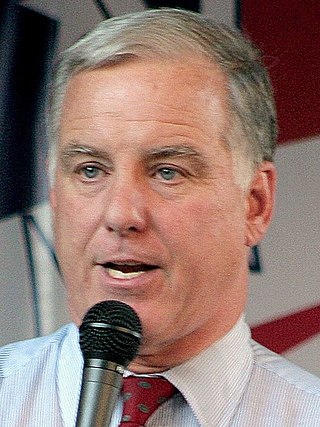
The 2004 Vermont Democratic presidential primary took place on March 2, 2004, as part of Super Tuesday along with other primaries and caucuses held throughout the country. Vermont's 15 pledged delegates were allocated based on the results of the primary.

Presidential primaries and caucuses are being organized by the Democratic Party to select the delegates to the 2024 Democratic National Convention, to determine the party's nominee for president in the 2024 United States presidential election. The elections will take place in all 50 U.S. states, the District of Columbia, five U.S. territories, and Democrats Abroad, and will be held between January and June that year. Incumbent President Joe Biden is running for re-election with Vice President Kamala Harris as his running mate. Biden maintains a significant lead in polls, and no incumbent president has lost nomination since 1884.
The following is a timeline of the 2020 Democratic Party presidential primaries in the United States, beginning after the election of Donald Trump in the 2016 United States presidential election. Joe Biden won the primary and eventually defeated Trump in the 2020 United States presidential election.
